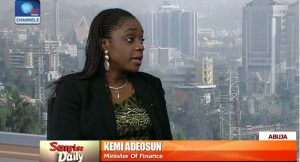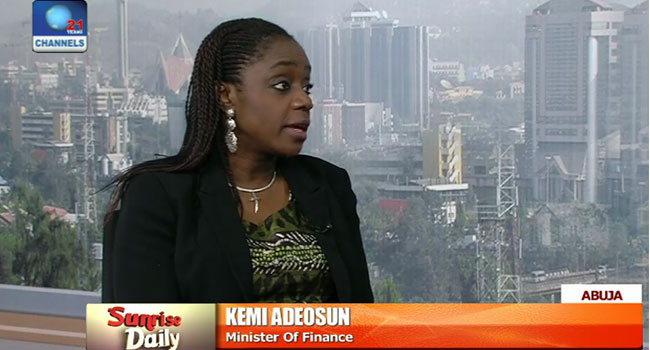
Mrs Adeosun was the guest of Channels TV’s breakfast programme, Sunrise Daily on Tuesday, September 20, where the conversation centered on the state of the Nigerian economy.
She recalled that the country had been in negative growth since 2012 with the hope that it would avoid recession but since the reality of the recession has dawned on the nation, the government is prepared to address it.
“Our plans haven’t changed. We need to stimulate the economy and we are going to do so largely by redirecting expenditure from recurrent into capital because we believe that capital expenditure will create jobs and create more productivity in the economy in the long run and help us to diversify,” she said.
The Finance Minister noted that the solution to Nigeria’s problem has been the same and getting out of recession remains dependent on how productive the economy becomes as well as how well it can create jobs.
“To do so, we’ve got to invest in our capital infrastructure,” she maintained.
Emergency Powers
There have been talks about the executive arm of government sending a bill to the legislature seeking executive powers for the President to help drag the economy out of recession and Mrs Adeosun explained the rationale behind the bill.
She said: “There are a number of bottlenecks that we have already identified and which we think that given where we are, it might be worthy looking at how to unlock them.
“For example, we have pumped a fairly large amount of capital into the economy through various ministries, departments and agencies, some of whom have deployed it very quickly and are ready for more and we are about to release another tranche of 350 billion.
“But there are some ministries that have been slowed down by the procurement processes. It is about transparency versus speed. We want open tenders because that gives us the best price and that is what also gives opportunities to Nigerians to bid for and to get government contracts.
“If it is taking four to 16 weeks to get through the bureaucracy, at this point in time we think we can’t afford those delays. So we need to say ‘look, procurement laws are made for usual times and these are unusual times, can we look at relaxing some of the condition?’
“Similarly there is a transaction we are working on at the moment which is a very pivotal transaction with General Electric – they want to run freight on our own rail system which will create huge number of jobs across the country.
“But it’s bogged down in rules that say you’ve got to do this and that you’ve got to advertise and keep it up for a while. We don’t have that time.
“So there are some areas where I think it would be useful to have some legislative amendments.”
The Worst Is Over
The Minister also agreed with an earlier statement by the Governor of the Central Bank of Nigeria, Mr Godwin Emefiele that the worst of the recession was over.
She explained that the level of problems that the economy has had to deal with – ranging from the drop in oil price to the Niger Delta crisis that led to drop in oil production quantity are indeed the worst that could only have been imagined.
“So our worst case scenario in terms of our planning has already happened and I think that is probably what he was trying to say.
“From now on, the only way really is up. The only way is recovery, the only way is forward,” she assured Nigerians.
Low Interest Rates
As Nigerians await the outcome of the Central Bank’s Monetary Policy Committee (MPC) meeting, the Minister of Finance hoped that the committee would lower key interest rates.
Mrs Adeosun believes that this will help stimulate the economy, especially as the government plans to boost the economy without increasing debt servicing costs.
At the last committee meeting in July, the benchmark Monetary Policy Rate was raised from 12 percent, to 14 percent, while the Cash Reserve Ratio and Liquidity Ratio were both retained, at 22.50 per cent and 30 per cent each.
The CBN is also expected to give an update on new flexible forex market.



